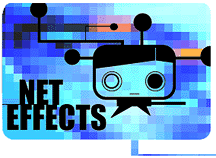The site in question includes
political commentary covering many different issues, but Bush is likely
most upset about its coverage of his alleged past cocaine use.
Bush has reportedly been trying to strong-arm the site's creator (Zach
Exley, a Boston-area computer consultant working in concert with the
corporate culture-jamming, anti-trademark RTMARK) into shutting the parody site
down. Lawyers for the soon-to-be candidate sent a cease-and-desist letter
to Exley last month, then threatened to sue for copyright infringement,
and later offered to buy the domain name. Exley refused.
There are serious questions now that the case has gone to the feds. The
FEC complaint argues that a politically inclined Web site valued at more
than $1,000 must register with the FEC before publishing material that
could positively or negatively affect the outcome of an election.
Apparently Bush's lawyers insist the site is worth more than $1,000 simply
because Exley wouldn't sell it to them for 350 times that amount.
How scary is that?
One wonders why Bush doesn't demand the same of newspapers, which
frequently publish material that is beneficial or harmful to candidates
during an election cycle. After all, much more convincing argument could
be made that the New York Times is worth more than $1,000.
Clearly, there is a First Amendment issue here. The FEC is reportedly
considering the Bush proposal even as it explores possible ways to
"regulate" political domains.
Current law and the policy established by the new domain cops, the
Internet Corporation for Assigned Names and Numbers (ICANN), protects
certain copyrighted words and phrases from being registered by anyone
other than the copyright holder. In other words, you couldn't register
www.palmolive.com if it were available, because Colgate-Palmolive owns it.
But there are gray areas here. Certain copyrighted phrases or words become
part of the public's lexicon, or have alternative meanings. That's why
Colgate-Palmolive lost its campaign to force ajax.org to surrender its
domain.
Perhaps copyright law doesn't hold the solution on this matter. Even if
the FEC decides to implement some regulation of spoof domains, it would
instantly be challenged in court by the media (all of which have a strong
interest in how this case plays out). I suspect Bush will lose on the
basis of libel law.
Libel law states that you can publish almost anything about a public
figure involved in something newsworthy (say, an election) as long as you
know or are reasonably sure of its accuracy. Sure, some journalists and
tabloid hacks abuse the privilege, but for the most part the law offers
the leeway to ensure that our elected officials and other people in power
don't get away with screwing the public.
Cyberphilosophers like John Perry Barlow often preach that "old media"
law should not be applied to the new media, because the paradigms are so
radically different. But this is a case where the usual suspects switch
sides. This is about freedom, and old media law has a long, time-honored
tradition of protecting its own freedom. That is why Bush would think to
sue the Web site that criticized him, but would never dream of suing a
newspaper columnist who opposed him. In these early years of the Web, the
law has yet to catch up. And if people like Bush continue to target the
Web on the free-speech front, the Web-based media could end up far more
restricted and regulated than its print and TV counterparts.
The Internet is going to be a key political issue in the next
presidential election. At the moment, Steve Forbes looks like the sharpest
knife in the drawer. Poor Al Gore with his misinterpreted claim of having
invented the Internet is bound to be the butt of every low blow on the
issue of the Net. So much for being the "technology V.P." He'll get no
credit for that this year.
But if Bush decides to push this, it could end up backfiring. With the
campaign amplifying every move the candidates make, they'll have to choose
their battles wisely. Pursuing this not only increases that parody site's
profile but also alienates the growing Libertarian sector of the GOP and
many conservative Democrats. If Bush has any sense, he'll let it go.




 Copyright © 1994-98
San Francisco Bay Guardian.
Copyright © 1994-98
San Francisco Bay Guardian.
